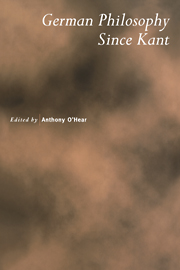Book contents
- Frontmatter
- Contents
- Preface
- Notes on Contributors
- Fichte and Schelling
- Hegel's Critique of Foundationalism in the ‘Doctrine of Essence’
- Schopenhauer's Pessimism
- Karl Marx
- Nietzsche's Virtues: A Personal Inquiry
- Bolzano, Brentano and Meinong: Three Austrian Realists
- Vorsprung durch Logik: The German Analytic Tradition
- German Philosophy of Mathematics from Gauss to Hilbert
- The Revolution of Moore and Russell: A Very British Coup?
- Husserl's Concept of Being: From Phenomenology to Metaphysics
- Frege and the Later Wittgenstein
- Otto Neurath, the Vienna Circle and the Austrian Tradition
- Does the Nothing Noth?
- Reactionary Modernism
- Adorno on Disenchantment: The Scepticism of Enlightened Reason
- Habermas, Science and Modernity
- German Philosophy Today: Between Idealism, Romanticism, and Pragmatism
- The Career of Aesthetics in German Thinking
- Hermeneutic and Analytic Philosophy. Two Complementary Versions of the Linguistic Turn?
- Index of Names
German Philosophy of Mathematics from Gauss to Hilbert
Published online by Cambridge University Press: 29 September 2009
- Frontmatter
- Contents
- Preface
- Notes on Contributors
- Fichte and Schelling
- Hegel's Critique of Foundationalism in the ‘Doctrine of Essence’
- Schopenhauer's Pessimism
- Karl Marx
- Nietzsche's Virtues: A Personal Inquiry
- Bolzano, Brentano and Meinong: Three Austrian Realists
- Vorsprung durch Logik: The German Analytic Tradition
- German Philosophy of Mathematics from Gauss to Hilbert
- The Revolution of Moore and Russell: A Very British Coup?
- Husserl's Concept of Being: From Phenomenology to Metaphysics
- Frege and the Later Wittgenstein
- Otto Neurath, the Vienna Circle and the Austrian Tradition
- Does the Nothing Noth?
- Reactionary Modernism
- Adorno on Disenchantment: The Scepticism of Enlightened Reason
- Habermas, Science and Modernity
- German Philosophy Today: Between Idealism, Romanticism, and Pragmatism
- The Career of Aesthetics in German Thinking
- Hermeneutic and Analytic Philosophy. Two Complementary Versions of the Linguistic Turn?
- Index of Names
Summary
Introduction
Suppose we were to ask some students of philosophy to imagine a typical book of classical German philosophy and describe its general style and character, how might they reply? I suspect that they would answer somewhat as follows. The book would be long and heavy, it would be written in a complicated style which employed only very abstract terms, and it would be extremely difficult to understand. At all events a description of this kind does indeed fit many famous works of German philosophy. Let us take for example Hegel's Phenomenology of Spirit of 1807. The 1977 English translation published by Oxford has 591 pages, and as for style here is a typical passage:
Self-consciousness found the Thing to be like itself, and itself to be like a Thing; i.e., it is aware that it is in itself the objectively real world. It is no longer the immediate certainty of being all reality, but a certainty for which the immediate in general has the form of something superseded, so that the objectivity of the immediate still has only the value of something superficial, its inner being and essence being self-consciousness itself. The object, to which it is positively related, is therefore a self-consciousness.
- Type
- Chapter
- Information
- German Philosophy since Kant , pp. 167 - 192Publisher: Cambridge University PressPrint publication year: 1999
- 3
- Cited by

